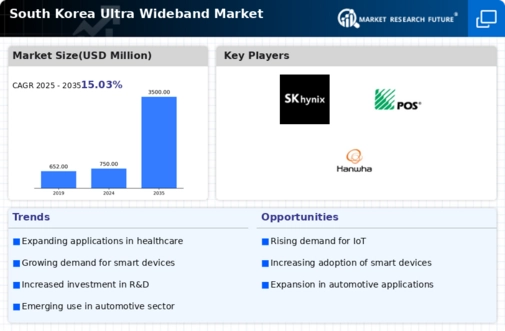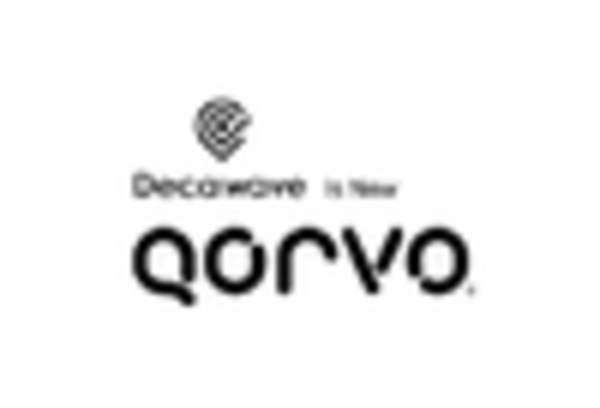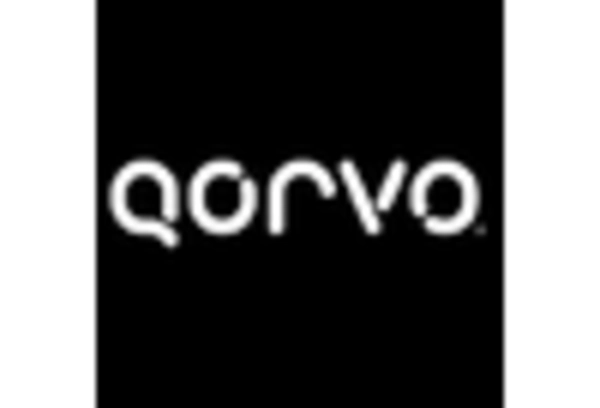Integration with 5G Networks
The rollout of 5G networks in South Korea is likely to create new opportunities for the ultra wideband market. As 5G technology promises faster data speeds and lower latency, the integration of ultra wideband solutions can enhance the performance of various applications, including augmented reality and virtual reality. This synergy may lead to innovative use cases that leverage both technologies, driving demand for ultra wideband solutions. Market analysts project that the 5G market in South Korea will exceed $5 billion by 2025, indicating a robust growth trajectory. Consequently, the ultra wideband market may experience increased investments and collaborations aimed at developing complementary technologies that capitalize on the advantages of both 5G and ultra wideband.
Expansion of Smart Home Technologies
The proliferation of smart home technologies in South Korea appears to be a key driver for the ultra wideband market. As consumers increasingly adopt devices such as smart speakers, security systems, and home automation tools, the demand for reliable and high-speed connectivity intensifies. Ultra wideband technology, with its ability to provide precise location tracking and low-latency communication, is well-suited for these applications. Market data indicates that the smart home segment is expected to grow at a CAGR of approximately 20% over the next five years, further fueling the ultra wideband market. This growth is likely to encourage manufacturers to invest in ultra wideband solutions, enhancing their product offerings and driving competition within the industry.
Advancements in Healthcare Technologies
The healthcare sector in South Korea is undergoing rapid transformation, with an increasing focus on digital health solutions. The ultra wideband market is poised to benefit from this trend, as the technology enables precise tracking of medical equipment and patients within healthcare facilities. Hospitals are adopting ultra wideband systems to improve operational efficiency and patient safety. According to recent data, the healthcare technology market is projected to reach $10 billion by 2026, with a significant portion attributed to location-based services. This growth suggests that the ultra wideband market will play a crucial role in supporting the evolving needs of healthcare providers, ultimately enhancing patient care and operational workflows.
Rising Demand for Location-Based Services
The demand for location-based services in South Korea is on the rise, driven by the increasing use of mobile applications and smart devices. Ultra wideband technology, known for its high accuracy in positioning, is well-positioned to meet this demand. Industries such as retail, logistics, and transportation are exploring ultra wideband solutions to enhance customer experiences and operational efficiencies. Market data suggests that the location-based services market is expected to grow at a CAGR of 25% over the next few years. This growth indicates that the ultra wideband market will likely see increased adoption as businesses seek to leverage precise location data for competitive advantage.
Growth of Automotive Connectivity Solutions
The automotive sector in South Korea is witnessing a shift towards advanced connectivity solutions, which is likely to bolster the ultra wideband market. As vehicles become increasingly equipped with smart technologies, the need for secure and efficient communication systems grows. Ultra wideband technology offers advantages such as precise positioning and low power consumption, making it an attractive option for automotive applications. Recent estimates suggest that the connected car market in South Korea could reach $15 billion by 2027, driven by consumer demand for enhanced safety and convenience features. This trend indicates that the ultra wideband market will be integral to the development of next-generation automotive technologies, fostering innovation and competitiveness.















